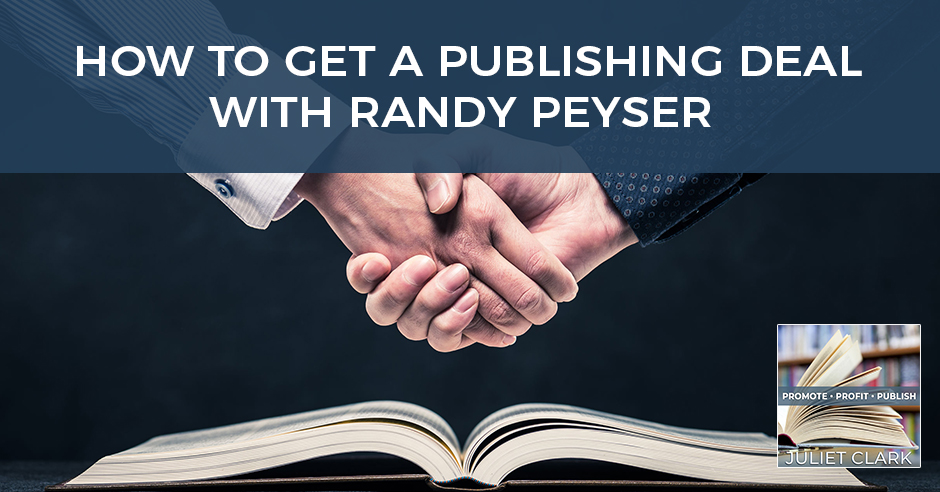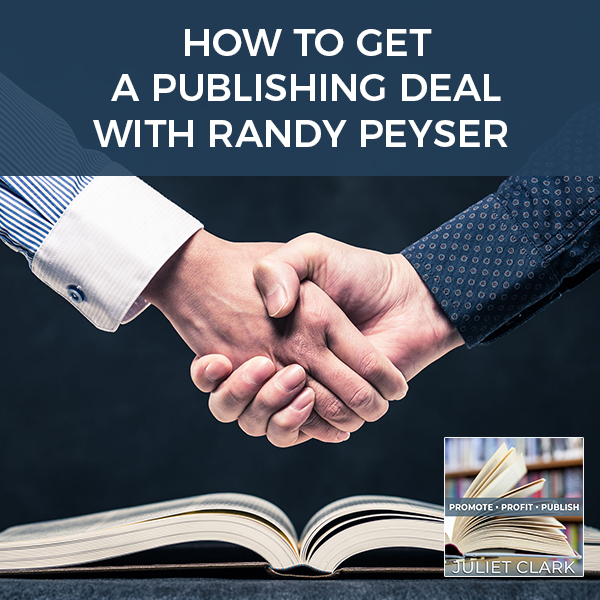
Literary agents receive over 1,500 manuscripts a year. With publishers, it’s about 10,000 or more a year. If you want to get a publishing deal and more readers, you’ve got to know what publishers and readers buy and how to make your book stand out from the pack. Publishing coach Randy Peyser pitches books to agents and publishers after her company edits or ghostwrites them through her company, Author One Stop, Inc. Randy shares how she makes it all happen.
—
Listen to the podcast here:
How To Get A Publishing Deal with Randy Peyser
We are here for the second part of our interview with Randy Peyser. Before we get started, I wanted to remind you guys to go over and take our Promote Profit Publish quiz. You can find it at www.PromoteProfitPublishQuiz.com. Randy gets book deals with publishers. If there’s a book you want to write, a book publisher, readers and she helps you make that all happen in the same book. Sometimes we don’t get that right. Literary agents receive over 1,500 manuscripts a year and publishers, about 10,000 or more a year. If you want to get a publishing deal and more readers, the publishers and the readers and what they buy, you have to know how to make your book stand out from the start. Randy is a publishing coach who pitches books to agents and publishers after her company edits and ghostwrites them through her company, Author One Stop, Inc. Welcome, Randy.
Thank you very much.
Last time we talked a lot about traditional publishing. This time, I want to talk a little bit more about what are the hot topics, how to name books and some other things that are important for these people. What are the hot topics that you’re able to sell to publishers?
Think about what’s trending in the news. #MeToo is incredibly hot. They’re writing fiction. Werewolves are out. Vampires are still in. It depends. One of the things that’s most important is bringing something new to a conversation that’s already happening. That’s critical to the key to a sale of any book that you’re writing or would want to write. I love to do a positioning consultation with people right up front because I tell people, “If there’s a book you want to write, a book publisher is going to buy or readers going to buy and are they the same book?” What makes the same book? For example, publishers are looking for topics that are outcome-driven. I gave the example, acupressure for anxiety. They say people buy to either increase pleasure or reduce pain. Of the two, reducing pain is the bigger issue. What is your target market’s pain points? What is the solution you provide? This is a critical piece of it. All the books out there, let’s call them the competition, are they providing the same solution that you do?
For example, the Law of Attraction became big with the publishing of The Secret. There are all these Law of Attraction knockoff books or for example, happiness was a big seller for a long while. Marci Shimoff the author Happy for No Reason, a New York Times bestseller. I had a great happiness book and I was pitching it in New York to the publishers. The publishers one after another they were saying, “Happiness has already been done. Marci Shimoff owns that market.” What would be so unique that I can position that book correctly? The one I was pitching at the time and one of the agents said, “Why don’t you call this a book about liberation from fear, liberating yourself from fear?” It’s the same topic, different positioning, so I started pitching it like that. All of a sudden, I’m hearing yes from all these different agents or publishers. It was about getting the right positioning for each topic. The way I go about that, let’s say I’m doing a position consultation with somebody, I have them talk about their book. Typically, one of two things happens consistently.

Publishing Deal: Bringing something new to a conversation that’s already happening is critical to the sale of any book that you’re writing or would want to write.
Almost every single time, all of a sudden, the person is speaking. I hear something that comes out of their mouth and I go, “There’s your title,” and they go, “Oh my God.” It’s something that comes through naturally in their conversation and they don’t even hear it, but I get it because I’m looking for it. I’m intentionally listening for that while we’re speaking. As I said, those titles come in one of two ways in the correct positioning. Either I hear it directly from the person’s mouth or I get the download while they’re speaking. I want that title to be a goosebumps title. It’s like, “That’s it.” We both understand that that’s it. For example, Lauren Miller was one of my clients. She had a book on stress relief. Her original title was 5 Minutes to Stress Relief. I came up with the title Grab and Go Stress Relief. She loved that. She decided she was going to do a whole brand around that. She was thinking about grab and go nutrition, whatever the grab and goes where. She thought here’s a whole branded series. I sold it under that title to a publisher. However, the publisher changed the title back to 5 Minutes to Stress Relief. They would have done better in overall sales if it had been Grab and Go, personally.
That brought up a great conversation we had at CEO Space. I have a book coming out and I was naming it along the lines of my brand, Promote, Profit, Publish. We’re still going back and forth with that more action-oriented, solution-oriented title. I want to bring that up about don’t get all excited about the brand until you have that name that’s going to work.
It’s interesting too that I’ve discovered over all these years, publishers do not care about your brand. You care about your brand. Publishers do not at all. If you’re naming your book after your brand and you’re going for a traditional publisher, please don’t be attached to it because publishers change titles 98% of the time. I’ll give you an example of my own book. The first book I wrote, my original title was, From Crappy to Happy, A Journey Out of the Pits and Into the Fruit of Life. I thought that’s witty. The publishers took off from it and it became Crappy to Happy. Listen to the change in my subtitle, Small Steps to Big Happiness Now! Why? Their marketing department came up with the title because Small Steps to Big Happiness Now! answered the question in the reader’s mind, what’s in it for me? Somebody walks into a bookstore and they have a gazillion titles in that store. All they see is the spine of your book, what’s on that spine? Because that’s what has to grab them. If you have an outcome driven title that’s going to grab them.
One of the things that I wanted to talk about on here is it’s shifted from the traditional into a little bit more about marketing. You and I discussed platform building on the last one. It’s essential. What can people do that is cost-effective after their books come out? A lot of the traditional publishers do not do the marketing like they used to. What would you recommend for authors? They’re going to sell it to the platform they built, but how do they broaden that audience with the book marketing?
There’s one new program that I’m involved with that I absolutely love. Not only do I love it, but there’s going to be an article in USA Today about it. It is going to be featured in Publishers Weekly. It has been on Forbes.com. It was on the Delta Sky Magazine on the airlines a few months ago. Penguin Random House, Simon & Schuster, HarperCollins, MacMillan, Hachette, Ballantine and many, many other publishers are also using this consistently every single month, but it’s also open to individual authors and to self-published authors. There’s a program called Bedside Reading. It’s at BedsideReading.com. A friend of mine started it. Her name is Jane Ubell-Meyer. We are placing books by the bedsides in five-star luxury hotels and in boutique hotels as complimentary copies for guests to get out word of mouth marketing. The program is hugely successful in terms of creating that accessibility to high-net-worth families, individuals, CEOs, celebrities, the people staying at the Waldorf Astoria, Shutters on the Beach, The Conrad on Wall Street, Acqualina Resort & Spa in Florida and many other boutique hotels and five-star luxury hotels. This is a word of mouth marketing program. That’s working incredibly well. Here’s the distinction I want to make between marketing and sales. For example, in Bedside Reading, we’re right up front. We tell people “We’re not selling your book. This is a complimentary copy to create word of mouth.” That’s what we’re able to deliver. Publishers love this program. That’s why so many people are using them. Nobody else in the entire world that we know of does a similar program.
In that first sentence, in that first paragraph, the reader has to be hooked. Share on XYou and I had some authors earlier that I do want to mention for self-published authors, you have to have a significant amount of sales. The people that we referred over to Randy were people who had made the USA Today bestseller lists.
Truthfully, you don’t have to have a track record of sales for Bedside Reading, but the book has to be appropriate for those kinds of hotels. We vet the book first and then we send it to the hotel. We give them an Amazon link. What they want to see, what we want to see are five-star reviews on Amazon. That’s what we need. The book doesn’t have to have a big track record of sales. These are the criteria. We call it recent and decent. No political, erotica or strongly-opinionated. A lot of the hotels wants fiction. They want high-quality fiction and thrillers. We have some business hotels. We’re booked up through spring of 2019 with our business books. They’re looking more for gift books, children’s books. Some of the hotels love the program so much, they’ve started children’s story hours. All of these hotels promote to their own lists, which is cool. We provide social media images that you can keep blasting out because this is an exclusive program. Books are vetted. People can announce. My book had been accepted into this program. My book is being featured at Shutters on The Beach. There are actual images of it.
There’s a new program for Bedside Reading, we’re taking audiobooks and eBooks. It’s very cool. They got to see a bunch of good reviews and feel like it’s a good fit. Jane pairs the books with particular hotels. She says it’s like pairing a fine wine. She knows who likes what and who’s looking for what. That’s a great program. The other thing I want to recommend to people is I like what I call captive audiences. For example, a bookstore is not so much a captive audience, but where is the real target market for your book? For example, if you’re a mind, body, spirit author or a Christian author, can you get into your church to do a sermon or can you get in front of that particular group? For example, I wrote a book called The Power of Miracle Thinking. I speak for churches and synagogues and all kinds of sermons that I deliver, for all kinds of those organization. I have a group of people in a room that is already going to be there. If you’ve got a business book, get to those local networking and business events as a speaker. You want to be in front of captive audiences for back-of-the-room sales. That’s a good way to do it.
Back-of-the-room sales and also using the assessment marketing to drive other people in the room, who don’t go to the back of the room to your book as well. One of the things that I am asked over and over is about endorsements. How do you get the people who write your foreword? How do you get the people, if you don’t know somebody famous, to put those endorsements, to give you those endorsements for the back of your book?
Let’s separate this into two questions, one about the foreword and one about endorsements. I’ll speak about endorsements first. When you’re talking about endorsements, you’re looking for a one to two sentence endorsement, really short. You don’t want paragraphs. Write out some potential endorsements for your book that you can send to someone who’s appropriate. That’s the first thing because you know how busy you are, you know how busy your inbox is, do you have time to be thinking of endorsements or people and reading their material? Most likely not. When you’re going to send an endorsement to somebody, give them some examples and ask them, “Would you be willing to endorse my book with one of these examples?” They can tweak it, edit it, whatever and maybe send them the introduction, maybe send them your table of contents and maybe one chapter.

Publishing Deal: If you’ve got a business book, get to the local networking and business events as a speaker. You want to be in front of captive audiences for back-of-the-room sales.
Nobody’s asking for the entire book. That’s what you’re going to send, but who do you send it to and how do you get them? My secret question is that I ask is the question is not what can I get, but what can I give? If you’re going after somebody, let’s say, they’re a famous person. For example, I write for magazines, so I might interview a famous author or best in which I do, New York Times bestselling authors. At the end of the interview, I’ll say, “I have a new book coming out. Would you be willing to provide an endorsement?” “Yes, I’d be happy to,” because I’ve given to them. If you’re not writing magazine articles, what can you do? Do these people hold events? Can you get on their radar? Is there something that you can give? There’s that reciprocity factor. There’s that energetic exchange.
There were some people that love to give endorsements. For example, Brian Tracy a couple of years ago, I don’t know if that’s still true, he couldn’t wait to provide endorsements because for every endorser, they’re getting their name and their book on the back of your book for their own advertising. I once saw Mark Victor Hansen at an event where he was speaking where he wrote an endorsement on somebody’s hand without seeing one word. There are people that want to get their own names out on books. Also think about people in your own league, other peers, who are coming out with books or people who you’re on their email list and you’re getting their newsletters and they have new books out. All those people want to advertise through their own books. Those are good markets to go after and you’re already on their list. That’s about endorsements. Now, getting a foreword written. My company is writing forewords where we have an author who has a famous person who said, “Yes, I’ll write a foreword.” We’re writing the foreword for them and then the person who approves it. We’re ghostwriting it. That’s a common practice now. To get somebody to write a foreword, they have to be so passionate about you or your book and that’s the truth of it.
That’s where we run into a lot when people ask that question is, do I want it to them already written? That’s a big ask to ask them to sit down and do it. Brian Tracy has written a lot of forewords for people I know as well.
Be careful about long forewords, prefaces and introductions. You want to get to the meat of your book as quickly as possible. A foreword is not always necessary. Keep the introduction on the short side. Don’t let it be about me, make it about you, about them, about your reader and how this book is absolutely going to benefit them and grab them by the short hairs. Immediately in that first sentence, in that first paragraph, that reader has to be hooked. I want to give you a good test. This is a good test that you can do in a group. I was speaking for a very large writers’ organization. Right after I spoke, the event organizer had a bunch of anonymous first pages. He had asked people who were interested to print out and give him their first pages. It’s anonymous. Their names aren’t on it. He read the first line and he asked this large group of people, “How many of you would keep reading this book based on this sentence?” A large number of hands went up. He read the first paragraph. How many of you would keep reading the book that? Then he read the next paragraph. A number of hands went down. Why? People gave feedback while the author anonymously in that room was listening and getting direct feedback. You got to grab people and if you can get actual feedback from a room full of people like that, how powerful is that? It’s a local writer’s group or someplace where you can try to get that feedback. It’s invaluable, but you’ve got to grab your reader quickly. I was working on a book. It was a twenty-page preface and then a large introduction. I’m going, “No, condense it and get into your chapters, get into your meat as quickly as you can.” If you’re vegan, get into your tofu. Whatever it is, do it quickly.
If you’re in front of a room getting a feedback, make sure it’s not your friends and your relatives because they will always say nice things. You want frank, blunt even if it hurts feedback because it’s honest.
With feedback, when you put everything in terms of strengths and weaknesses, that's helpful. Share on XI want to give you a way to ask for that feedback. People will be afraid. I remember being in a writers’ group when I was first starting out. There were three of us in our little group. We were afraid to give each other feedback until we created a format. What we asked for are the strengths and weaknesses. When you put everything in terms of strengths and weaknesses, that’s helpful. I got another hit in a meeting with the social media gal who was also writing her own book. She told me to take the word you out of that feedback. You’re addressing the writing itself, not you, you’re not making the author or the writer wrong. Address the actual writing itself in terms of strengths and weaknesses and it’s a great way to get feedback.
I love the way Adam Markel uses a feedback system about, “This is what worked for me, this is what didn’t work or didn’t resonate with me.” I’m trying to remember exactly how he says it, but it makes it very impersonal. It’s not like you’re attacking. It’s a great feedback system to help people. “This is what you could’ve done better.” I don’t know the exact wording, but he does it in such a great way that you can take the feedback constructively.
It’s funny that you mentioned Adam Markel out of the blue. He is the author of a book called Pivot and I helped Adam get his six-figure book deal in a bidding war between the HarperCollins, McGraw-Hill and Simon & Schuster. I did it with three words that got him a top agent. When I was pitching this book, the three words were and I shout to them, “I smell money.” That’s how I pitched that particular book. I inhaled like, “I smell money.” The agent, her eyes are popping out of her head. What do you get for me, Randy? It turned into that six-figure book deal in a big bidding war.
I have Adam’s book and I probably could get that feedback loop out of it. He’s going to be a guest on our show in January. I’m excited about that. A great speaking coach can help a lot of people out there who need to build a platform. One of my other questions that people ask all the time is what are the things that you must do to make your book stand out?
One is having a very unique topic. Second is definitely have that title that grabs. If it’s not a goosebump title, let’s please talk about it until it is. The third thing is to write on a topic that a publisher is interested in. If your topic is so niche, it’s possible that it can be sold, but if you’re writing to something that’s trending, you probably have a much better chance at it. I’ll give you an example. I edited a book and sold it to a publisher and the book is called Slave: A Human Trafficking Survivor Finds Life. It was about a four-year-old boy whose mother hands them over to a sex cult leader who takes him to Mexico. He grows up as a child slave until he escapes in his teens. He now has the Well Child Foundation in Oakland. Is human trafficking trending? Absolutely. Not only do I get to edit the book and get it sold to a publisher, but the publisher immediately gets it to three Hollywood major movie producers and it’s under consideration for film. This publisher also did a book deal with Sophie Turner from Game of Thrones.

Publishing Deal: Get to the meat of your book as quickly as possible. Don’t let it be about you. Make it about your readers and how this book is going to benefit them.
What is it? What else do they need to do to? An absolute must that they have to do to make the book stand up?
I would say definitely have the book analyzed. That’s one thing that my company does. The first thing we do when anybody brings in a manuscript is, I sent everybody an NDA. You want to know that your material is confidential. It’s protected. It’s yours. You own the copyright to it, so that’s key. The first is an NDA and then we analyze. We meaning I have a team of editors who work for me. The people who work for me, they’ve all worked for publishers or they’ve vetted many books that have sold to those big publishers. I wanted people who understood what publishers buy and what readers buy, not what great content is. I thought that’s a key piece. We analyze. We use the comments bar in Word. We’re going to pick out things like are you using pet words or phrases? For example, I had to book where the author kept saying, “Thus.” Nobody uses thus and it’s a pet word. I had another book where it felt like there were so much angst and drama in this book suddenly. We find what are the repetitive words. A lot of times people will repeat the same words and in paragraphs or in sentences, vary the language please, but it can’t sound stilted. Here’s another thing to look out for are weak words. Weak words are common verbs like have, had, was, are, got, get, went, go, very common words. It’s not that you can’t use them but vary the language without it being or sounding stilted. It sounds like somebody speaks.
That one is a big one and I even find myself doing it quite a bit. We’ve gotten very lazy with language. I find myself doing that all the time. Before I let you go on, I want to define something for the people reading, NDA is a nondisclosure agreement and we use them all the time with publishing. We use them a lot of times. I use them with people’s business, new products as well. For those who didn’t understand what she was talking about, that’s what an NDA is.
What’s funny about that? In my mind, everybody’s project is confidential. I’m never going to do anything with it except exactly what we’re contracted to do. There are different target market demographics, so people find me on LinkedIn, people find me on Facebook. LinkedIn people are ready to go. They understand that I’m a professional, this is what I do and I’m doing it for them to create their success. They’re ready to go. People on Facebook consistently were asking me, “How do I know you’re not a scammer?” It’s a completely different demographic. I figured, “Send everybody an NDA and a rate sheet. Everything’s up front. Getting back to our previous conversation, we start with an analysis, then the book can go back to you to strengthen anything we’re finding. Is there any place where you lost your reader or a potential publishing deal? We’re going to point those things out, so you can strengthen those areas or maybe there’s a story that needs to be inserted here to give an example, add an anecdote here. We’re going to provide simple things that you can do to improve the quality of your writing or of that project. We can come back after that and edit. Those are two of the steps that we do to get the content right.
Where can we find you and what exactly do you do for people? Can you list some of these services, so people know what they need you for? We know you analyze books. We know you pitch them. We know you edit because a lot of these books were edited. What else do you provide?
Have a title that grabs. If it's not a goosebump title, let's please talk about it until it is. Share on XA consultation, what is the right book to write. I have a report on that, but I’ll also speak to people about it as well called write the right book. Consultations about any aspect of getting a book published, that’s one. Analysis, editing, for every nonfiction project, there must be a book proposal, which is a business plan. It’s not a query letter. These are long documents. I have a shortcut for people to do them simply. We’ll talk about a book proposal. That’s the key to getting that book sold. Either I’ll write it, I’m a master of it or I’ll help guide a person through it depending on which method they prefer. We also ghostwrite. I have top ghostwriters and we do very high-level books. They’re confidential, I can’t tell you but we’ve done this book for this famous person or this book or that, but you can trust me that we have and we are because they’re confidential. We’re true ghosts. That means that when you see a book title and it has like know the title of a book by such and such with, the with person is the ghostwriter. We’re not with people. We’d like to be thanked on your acknowledgments page as your editors, but you’ll never know that we ghostwrote that book because it is your book.
You know who wrote the book.
Other times we’re editing the books. You don’t know who wrote the book and then I pitch. I go to New York. I pitch all your long via email and then at the giant publishing industry, the feeding frenzy in the United States is called BookExpo America. It happens in late May every year. I pitch live, 24 meetings in two and a half days where I’m verbally pitching and take a proprietary pitch sheet that I create for every single person that nobody else does. It absolutely tips the sale in the favor of all my authors. The project doesn’t have to be ready. I have pitched ideas where not one word was written. I’m taking my double-sided glossy, graphically designed gorgeous proprietary pitch sheet that I know a publisher needs or an agent needs in order to get a promise of consideration for when that project is ready. Bedside Reading, getting those books into the luxury hotels.
Where do we find you? How can we connect with you?
Randy@AuthorOneStop.com or you can go to AuthorOneStop.com and click on the contact link.

Publishing Deal: Address the actual writing itself in terms of strengths and weaknesses; it’s a great way to get feedback.
Thank you so much. This was a lot of great information. Thank you for making yourself available for two podcasts.
I love helping people be successful. I say a book is more than words on a page. It’s your dream. I get to help you birth your dream and that’s what’s exciting to me.
Thank you so much.
You’re welcome.
Important Links:
- Randy Peyser
- www.PromoteProfitPublishQuiz.com
- The Secret
- Happy for No Reason
- 5 Minutes to Stress Relief
- Promote, Profit, Publish
- Small Steps to Big Happiness Now!
- Forbes.com
- BedsideReading.com
- The Power of Miracle Thinking
- Pivot
- Slave: A Human Trafficking Survivor Finds Life.
- LinkedIn – Randy Peyser
- Facebook – Randy Peyser
- BookExpo America
- Randy@AuthorOneStop.com
- http://www.AuthorOneStop.com
About Randy Peyser
 There’s the book you want to write and the book a publisher – and readers – will buy: Are they the same book?
There’s the book you want to write and the book a publisher – and readers – will buy: Are they the same book?
Literary agents receive 1500+ manuscripts a month. Publishers receive 10,000+ manuscripts a year. If you want to get a publishing deal and more readers, you’ve got to know what publishers (and readers) buy and how to make your book stand out from the pack.
Publishing coach, Randy Peyser, pitches books to agents and publishers after her company edits or ghostwrites them through her company, Author One Stop, Inc., www.AuthorOneStop.com.
Love the show? Subscribe, rate, review, and share!









Leave A Comment